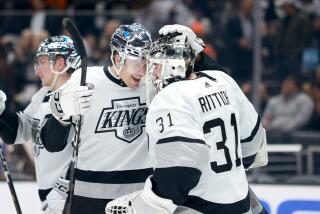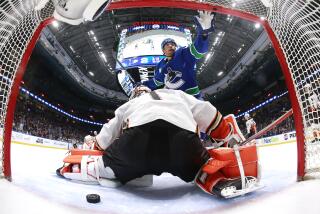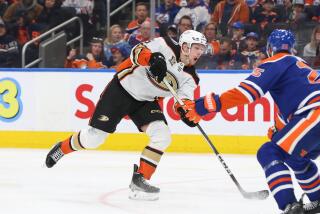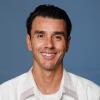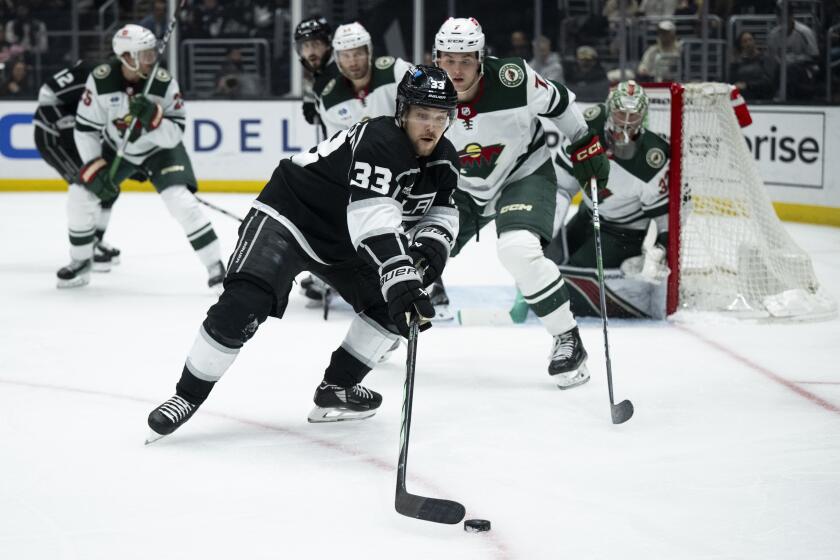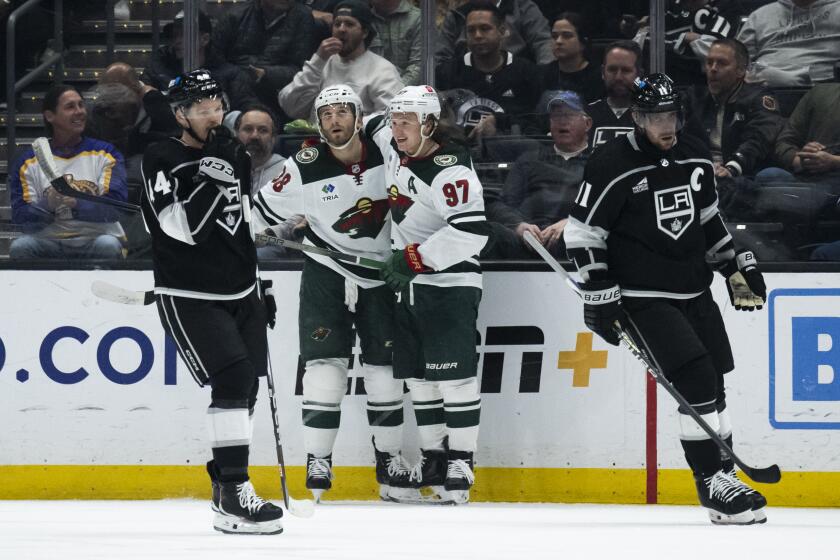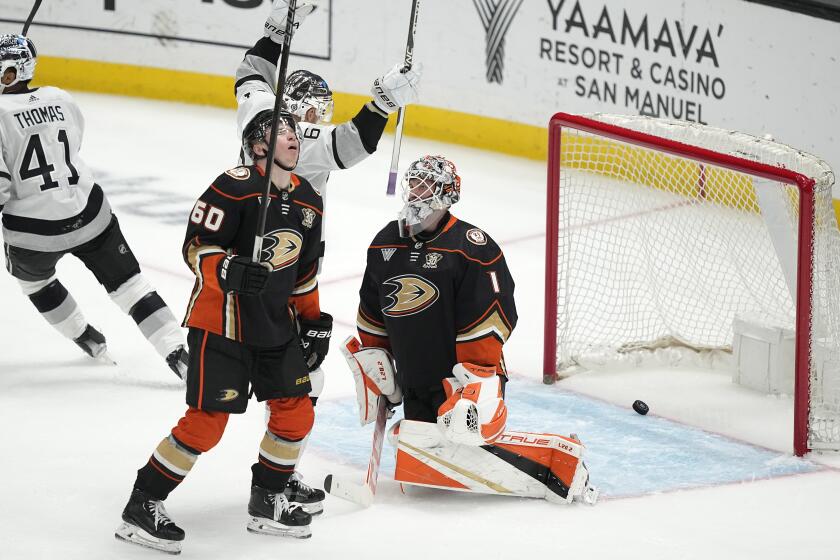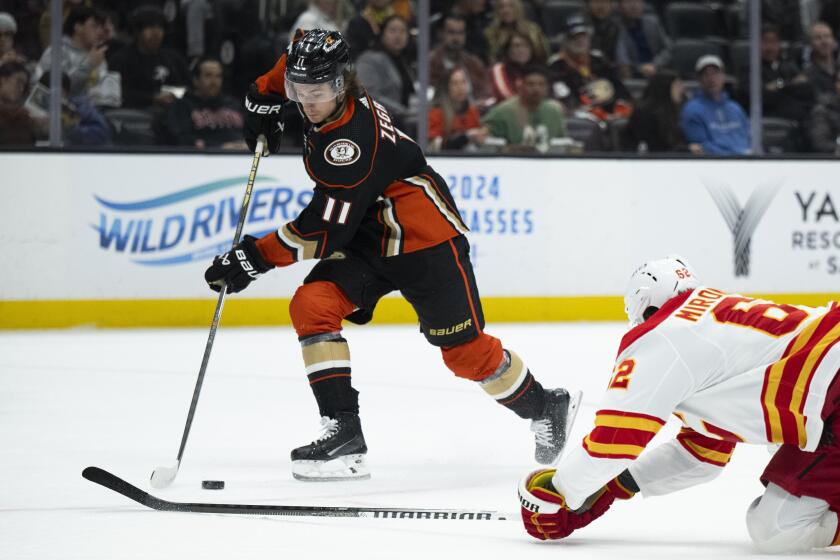Ducks will try to match their shutdown line against NHL scoring champion Connor McDavid
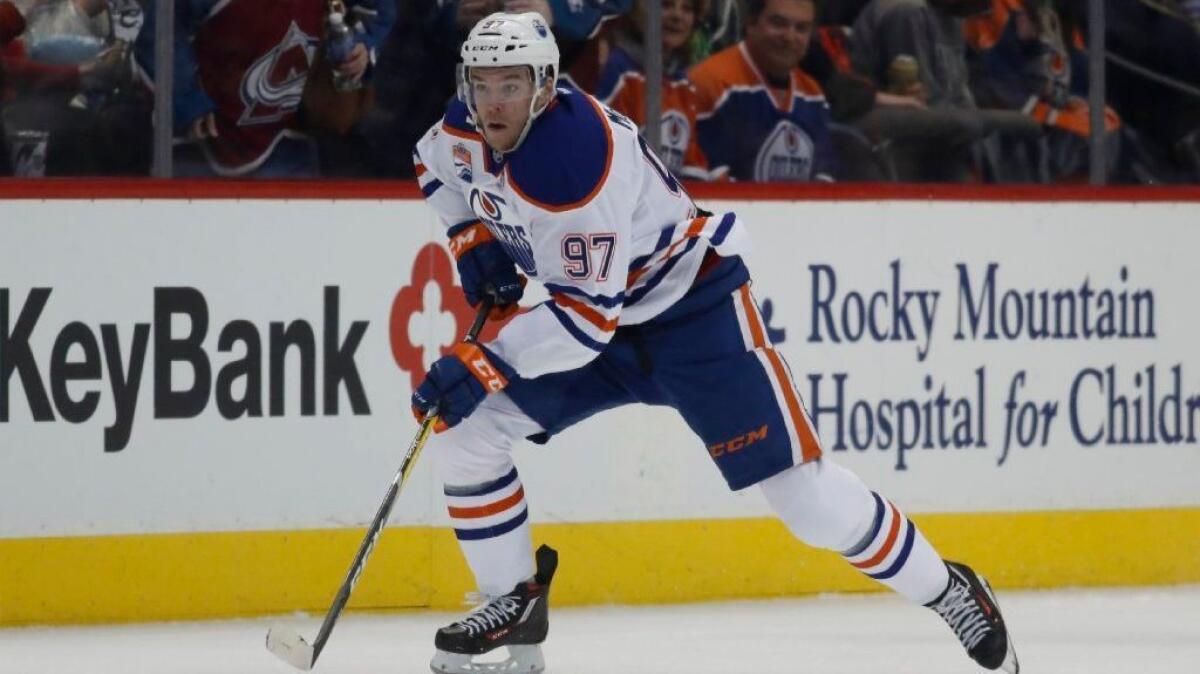
The exact origin of his line eludes Jakob Silfverberg, but he can piece some of it together.
He first played alongside Ryan Kesler and Matt Beleskey, and there was another variation with Carl Hagelin. Later, in the tenure of former Ducks coach Bruce Boudreau, the line of Silfverberg, Kesler and Andrew Cogliano was formed.
Those three have since been together for an eternity by hockey standards, by which forward duos are more common and line changes are sometimes made in pregame warmups.
“I don’t think I’ve seen [continuity like this] on any team I’ve been on,” Silfverberg said. “It’s a little bit unusual.”
Their rare three-man mainstay will play a major part in a best-of-seven, second-round playoff series against the Edmonton Oilers that gets underway Wednesday at Honda Center.
The Kesler trio is the top shutdown line in the NHL, and the Ducks will try to get them matched up against Edmonton’s top line of Connor McDavid, Leon Draisaitl and perhaps Patrick Maroon as much as possible. McDavid, 20, is the new face of the NHL, known for his bursts of speed, and he forces opponents to construct game plans around him.
Ducks coach Randy Carlyle noted that Edmonton coach Todd McLellan kept McDavid away from Kesler in certain situations in their last matchup, but McDavid’s line likely will face a big challenge, particularly in the first two games.
“They’re playing against probably the best defensive line in all of the NHL,” Maroon told reporters in Edmonton.
It’s natural to compare Cogliano, Kesler and Silfverberg to the shutdown line of Travis Moen, Samuel Pahlsson and Rob Niedermayer the Ducks used during their 2007 Stanley Cup championship run.
“Those guys played against everybody’s top line that they threw out,” said Corey Perry, a member of the ’07 team. “These guys are doing the same thing, and they’ve done that all season and seasons before. We’ve kind of gotten used to them being there every night.”
Cogliano credits Boudreau for having the foresight to group them together.
“He always talked about it,” Cogliano said. “He was the first guy who knew that it would work out. I think so far he’s been right about it.”
Like a rock-and-roll power trio, each member fuses ideally. Cogliano forechecks and cycles the puck. Silfverberg hangs on to the puck and often spins off a defender to create space, while Kesler goes to the net.
Silfverberg agreed that their communication is unspoken.
“I think any time you play with someone for a long period of time, you kind of learn the way they play,” Silfverberg said. “I think it’s something you gain over time. Now it happens automatically.”
Cogliano calls Silfverberg the most underrated player in the NHL because of his terrific shot and how he chases the puck. He also cited chemistry to fight for one another.
“I think we have a lot of fun and I think all our games complement each other in the right way,” Cogliano said. “So there’s a sense of wanting to play with each other and wanting to stick with each other and do good things.”
Kesler recently received his fifth nomination for the Selke Trophy for best defensive forward. If there were an award for the player who annoys opponents the most, he would also be a finalist.
But he debunked that premise.
“People think I try to go out and frustrate my opponent,” Kesler said. “I just play my game. If that frustrates them, that’s their problem.”
The Ducks’ six-week-long steamroll is a big problem for opponents. Coincidentally or not, the Ducks have not lost in regulation (15-0-3) since they reunited members of that ’07 team, which featured the aforementioned defensive line.
As chatter picks up about the Ducks as Cup contenders, Kesler, 32, was asked about the Cup window staring at him and teammates.
“Whenever you’re [presented with] a challenge you look and you might not get back there,” Kesler said. “It’s tough to make playoffs in this league, and it’s tough to win. For us, we’re just enjoying this ride and we know that there might not be too many chances.”
Injury updates
Cam Fowler said he feels good three weeks removed from his knee injury. He will consult with the team Wednesday but, asked if he would play in Game 1 if it were up to him, he said: “Based on how my body’s feeling, yeah, it would be [yes]. I feel strong. I feel like I’ve put myself through all sorts of game situations. The best you can do without actually playing.”
Defensemen Hampus Lindholm (undisclosed injury) and Sami Vatanen (upper body injury) practiced and Carlyle said all are close to returning.
“We’re looking at the possibility of having all three players back,” Carlyle said. “But that’s going to be definitely up to them to make the final decision on whether they’re ready to play or not.”
KEYS TO THE SERIES
1. LIMIT THE TOP LINE. Edmonton’s offense has balance but it is imperative not to let Connor McDavid and Leon Draisaitl skate with freedom. Ryan Kesler’s line will be used as much as possible here.
2. HEALTHY DEFENSE. The Ducks were able to withstand the absences of Cam Fowler and Sami Vatanen for all or most of the first round. It will go a long way if they and Hampus Lindholm are on hand for the entire series.
3. IMPROVED PENALTY KILLING. This was one trouble area for the Ducks with six goals allowed in the first round. Ducks coach Randy Carlyle saw a lot of standing around, and that won’t work against Edmonton.
sports@latimes.com
More to Read
Go beyond the scoreboard
Get the latest on L.A.'s teams in the daily Sports Report newsletter.
You may occasionally receive promotional content from the Los Angeles Times.
